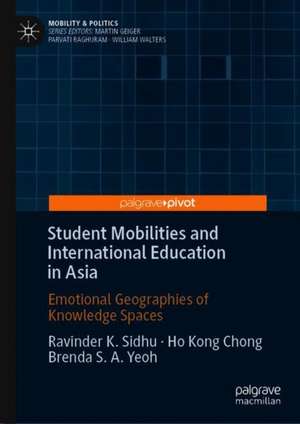Student Mobilities and International Education in Asia: Emotional Geographies of Knowledge Spaces: Mobility & Politics
Autor Ravinder K. Sidhu, Ho Kong Chong, Brenda S. A. Yeohen Limba Engleză Hardback – oct 2019
Din seria Mobility & Politics
-
 Preț: 383.12 lei
Preț: 383.12 lei -
 Preț: 385.25 lei
Preț: 385.25 lei -
 Preț: 451.65 lei
Preț: 451.65 lei -
 Preț: 450.11 lei
Preț: 450.11 lei -
 Preț: 385.62 lei
Preț: 385.62 lei -
 Preț: 416.92 lei
Preț: 416.92 lei -
 Preț: 419.06 lei
Preț: 419.06 lei -
 Preț: 384.86 lei
Preț: 384.86 lei -
 Preț: 415.18 lei
Preț: 415.18 lei -
 Preț: 384.48 lei
Preț: 384.48 lei -
 Preț: 415.77 lei
Preț: 415.77 lei - 15%
 Preț: 469.41 lei
Preț: 469.41 lei -
 Preț: 385.47 lei
Preț: 385.47 lei -
 Preț: 382.95 lei
Preț: 382.95 lei -
 Preț: 418.07 lei
Preț: 418.07 lei -
 Preț: 422.70 lei
Preț: 422.70 lei -
 Preț: 418.67 lei
Preț: 418.67 lei -
 Preț: 391.61 lei
Preț: 391.61 lei -
 Preț: 446.47 lei
Preț: 446.47 lei -
 Preț: 476.95 lei
Preț: 476.95 lei -
 Preț: 376.22 lei
Preț: 376.22 lei - 18%
 Preț: 890.37 lei
Preț: 890.37 lei -
 Preț: 379.30 lei
Preț: 379.30 lei -
 Preț: 482.56 lei
Preț: 482.56 lei -
 Preț: 385.84 lei
Preț: 385.84 lei -
 Preț: 384.09 lei
Preț: 384.09 lei - 18%
 Preț: 722.26 lei
Preț: 722.26 lei -
 Preț: 320.95 lei
Preț: 320.95 lei - 15%
 Preț: 695.34 lei
Preț: 695.34 lei -
 Preț: 319.21 lei
Preț: 319.21 lei - 15%
 Preț: 639.73 lei
Preț: 639.73 lei -
 Preț: 325.36 lei
Preț: 325.36 lei - 18%
 Preț: 782.57 lei
Preț: 782.57 lei -
 Preț: 383.33 lei
Preț: 383.33 lei -
 Preț: 416.92 lei
Preț: 416.92 lei -

-

-

Preț: 385.84 lei
Nou
Puncte Express: 579
Preț estimativ în valută:
73.85€ • 76.81$ • 61.89£
73.85€ • 76.81$ • 61.89£
Carte tipărită la comandă
Livrare economică 13-27 martie
Preluare comenzi: 021 569.72.76
Specificații
ISBN-13: 9783030278557
ISBN-10: 3030278557
Pagini: 143
Ilustrații: IX, 163 p. 1 illus.
Dimensiuni: 148 x 210 mm
Greutate: 0.36 kg
Ediția:1st ed. 2020
Editura: Springer International Publishing
Colecția Palgrave Pivot
Seria Mobility & Politics
Locul publicării:Cham, Switzerland
ISBN-10: 3030278557
Pagini: 143
Ilustrații: IX, 163 p. 1 illus.
Dimensiuni: 148 x 210 mm
Greutate: 0.36 kg
Ediția:1st ed. 2020
Editura: Springer International Publishing
Colecția Palgrave Pivot
Seria Mobility & Politics
Locul publicării:Cham, Switzerland
Cuprins
Chapter 1 Emotional Geographies of International Students: Beginning an East Asian Conversation.- Chapter 2 Assembling East Asian Knowledge Spaces.- Chapter 3 Emotional Geographies of University Officialdom.- Chapter 4 The Cultural Politics of Emplacement.- Chapter 5 ‘Feeling Regional’.- Chapter 6 Situating Critique and Care: What Kind of Asia?.
Notă biografică
Ravinder K. Sidhu is Associate Professor in the School of Education at the University of Queensland, Australia.
Ho Kong Chong is Associate Professor of Sociology at the National University of Singapore.
Brenda S. A. Yeoh is Raffles Professor of Geography at the National University of Singapore.
Textul de pe ultima copertă
“This is a beautifully written work that sets the imagination alight. Its inquiry into space/borders/emotions is at the cutting edge of studies of mobility. In bringing their student subjects alive for us, Sidhu, Ho and Yeoh have placed student movement and regional identity within Asia at the centre of world attention.”
—Simon Marginson, Professor of Higher Education, University of Oxford, UK, and Director of the ESRC/OFSRE Centre for Global Higher Education
This book investigates why students choose to study in key Asian cities, and how this trend relates to the strategic intent of states and universities to build ‘knowledge economies’ and ‘world-class’ profiles. Drawing on substantial theoretical and empirical research, the authors examine the emotional geographies of East Asian international education, and offer new analytical insights into the relations between emotions, nation and subjectivity. The book challenges Eurocentric views of Asia as a space of volatile nationalist rivalries. By offering richly textured portraits of mobile students, it questions contemporary memes about the utility-maximising Asian learner. This is a thought-provoking text that will appeal to university researchers, academics and students interested in the changing architectures of international education.
Ravinder K. Sidhu is Associate Professor in the School of Education, University of Queensland, Australia.
Ho Kong Chong is Associate Professor in the Department of Sociology, National University of Singapore, Singapore.
Brenda S. A. Yeoh is Raffles Professor of Social Science in the Department of Geography, National University of Singapore, Singapore.
—Simon Marginson, Professor of Higher Education, University of Oxford, UK, and Director of the ESRC/OFSRE Centre for Global Higher Education
This book investigates why students choose to study in key Asian cities, and how this trend relates to the strategic intent of states and universities to build ‘knowledge economies’ and ‘world-class’ profiles. Drawing on substantial theoretical and empirical research, the authors examine the emotional geographies of East Asian international education, and offer new analytical insights into the relations between emotions, nation and subjectivity. The book challenges Eurocentric views of Asia as a space of volatile nationalist rivalries. By offering richly textured portraits of mobile students, it questions contemporary memes about the utility-maximising Asian learner. This is a thought-provoking text that will appeal to university researchers, academics and students interested in the changing architectures of international education.
Ravinder K. Sidhu is Associate Professor in the School of Education, University of Queensland, Australia.
Ho Kong Chong is Associate Professor in the Department of Sociology, National University of Singapore, Singapore.
Brenda S. A. Yeoh is Raffles Professor of Social Science in the Department of Geography, National University of Singapore, Singapore.
Caracteristici
Examines intra-Asian student mobility in the context of university-driven processes of globalisation in Asia Focuses on mobile students who are attracted by the strategic global visions of institutional policymakers and who choose to study in an Asian university Uses emotions as a tool of analysis to explore how and why students develop a distinctly regional political consciousness which includes a sense of regional solidarity
